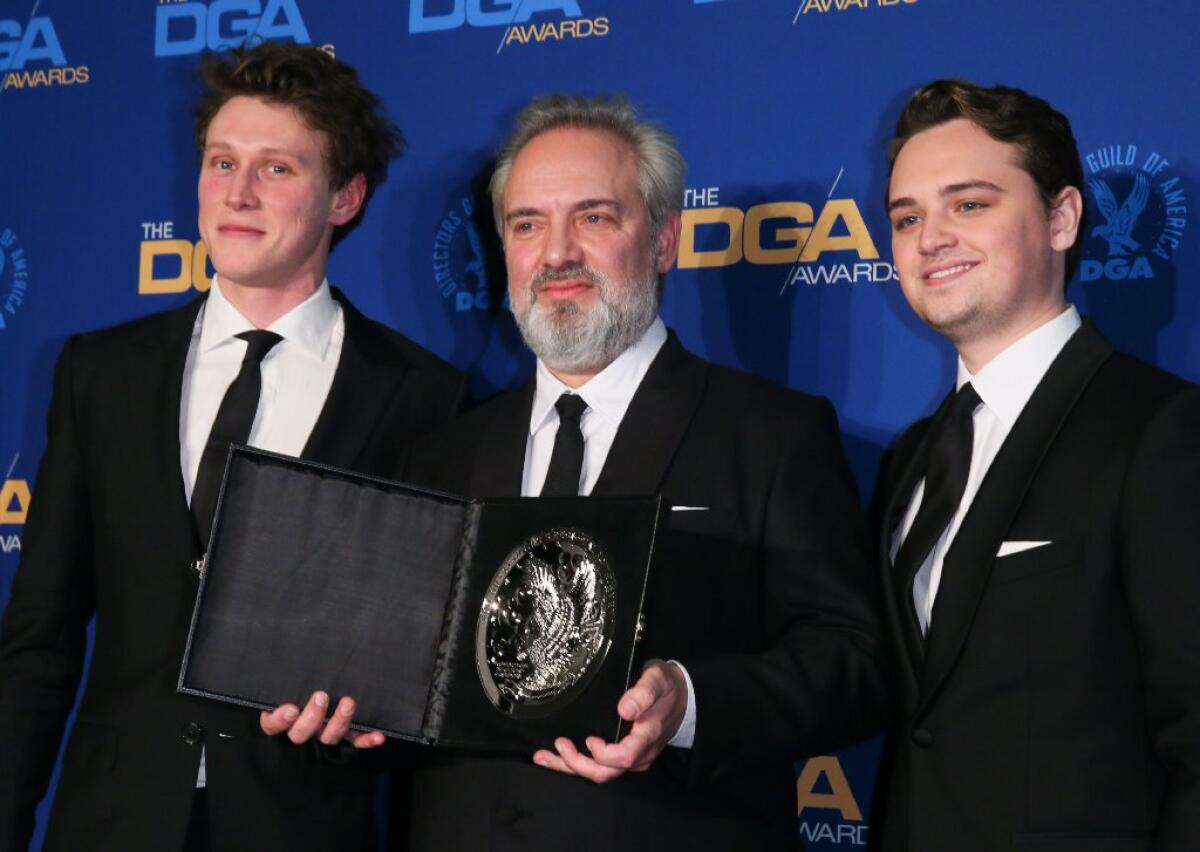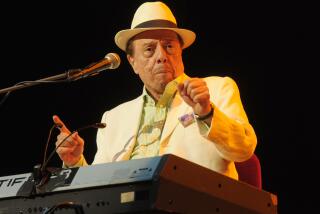‘1917’ a best picture shoo-in? With Sam Mendes’ DGA win, film steps closer to Oscar

- Share via
“1917” filmmaker Sam Mendes won the top prize at the DGA Awards on Saturday night, moving his celebrated movie one step closer to winning the Oscar for best picture.
The Directors Guild win, coupled with the war movie’s victory Jan. 18 at the Producers Guild of America Awards, makes the war drama the undeniable front-runner for the motion picture academy’s top prize.
And Mendes is now the favorite for the director Oscar, as 64 of 71 of the DGA winners have gone on to take the Academy Award.
It’s Mendes’ second DGA honor. He won 20 years ago for “American Beauty.” Mendes won the Oscar for the movie too.
“I didn’t feel like I knew what I was doing,” Mendes said, remembering that first award. “I feel a little more that I do now.”
Sam Mendes’ harrowing long-take thriller “1917” follows two young British soldiers through the trenches of World War I.
Mendes saluted his fellow nominees — Bong Joon Ho (“Parasite”), Martin Scorsese (“The Irishman”), Quentin Tarantino (“Once Upon a Time ... in Hollywood”) and Taika Waititi (“Jojo Rabbit”) and offered a rejoinder to culture watchers ready to write an obituary for cinema.
“For those who kicked the dirt on the grave of movies ... not so fast!” Mendes said.
It was one of two honors “1917,” which has also become a breakout box office success, won Saturday. Across town, cinematographer Roger Deakins collected the American Society of Cinematographers award, as expected, further cementing his inevitable second Oscar. Constructed to appear as if it’s one unbroken take, Deakins’ complicated, choreographed camerawork gives “1917” an astounding visual scope.
Alma Har’el won the first-time feature film director honor for “Honey Boy,” becoming the first woman to take that award. The honor came after DGA President Thomas Schlamme opened the evening by noting that 50% of directors working in television last year were women or people of color, up from 21% in 2014. He added that there was still work to do on the feature film side.
Har’el used her time on stage to note the letter female filmmakers sent this week, written by documentary filmmaker Jessica Dimmock, urging the Directors Guild of America to make accommodations for new and expectant parents.
“Tomorrow is the national board meeting of the DGA,” Har’el said, “and we’re counting on the DGA to fight for parents so they can birth the next generation of audiences and filmmakers.”
Steven Bognar and Julia Reichert won the documentary award for their film “American Factory,” which looked at labor issues at a closed General Motors plant that was bought and reopened by a Chinese industrialist. They were among many, including Tarantino, to give a shout-out to the power and importance of labor unions for the working class.
On the television side, HBO had a big night, sweeping the major series prizes. “Barry’s” Bill Hader repeated his comedy series win from a year ago for the surreal Season 2 episode “ronny/lily.” Johan Renck won the limited series prize for “Chernobyl.” And Nicole Kassell took the drama series award for “Watchmen.”
Additional winners included: Spike Jonze for the commercials honor, and James Burrows and Andy Fisher took the variety specials series award for “Live in Front of a Studio Audience: Norman Lear’s ‘All in the Family’ and ‘The Jeffersons.’ ” “Saturday Night Live” director Don Roy King won his fifth consecutive DGA award for variety/talk/news/sports series.
Jason Cohen earned Disney+ its first DGA award for the “Annie” episode of the reality program “Encore!” The children’s programming winner was Amy Schatz for the HBO documentary “Song of Parkland.”
Director Sam Mendes on the struggle to pull off his WWI epic, ‘1917’: from persuading Hollywood to make it to using technology to achieve a visual feat.
More to Read
Only good movies
Get the Indie Focus newsletter, Mark Olsen's weekly guide to the world of cinema.
You may occasionally receive promotional content from the Los Angeles Times.












